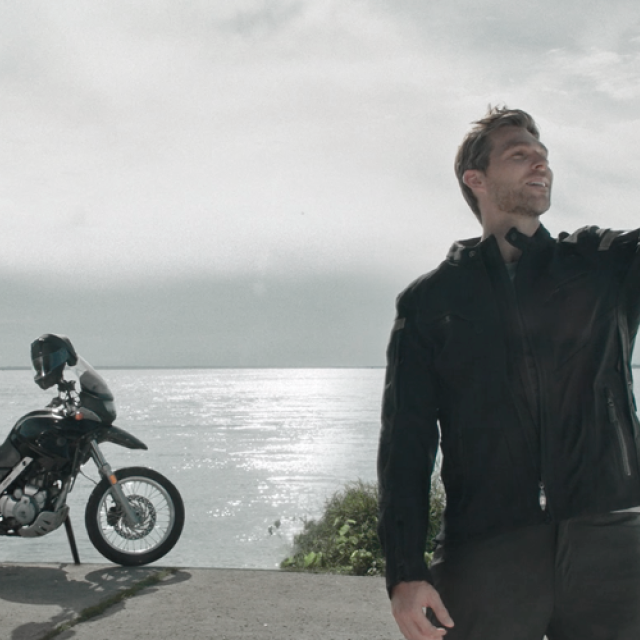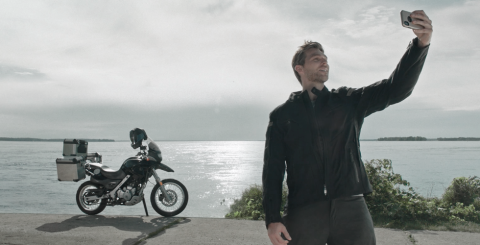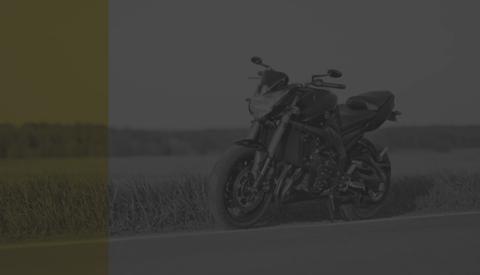Is a motorcycle upset covered?

Insuring your motorcycle can help you get compensation if any damage occurs. You should also think about how to limit the overall risk of accidents, whether or not there is a collision or upset. Keep reading to find out more.
Risks of motorcycle riding
According to some studies, in over 60% of fatal accidents, the motorcyclist alone was responsible for the crash. Of these accidents, 68% were not collisions. How is that possible?
In most cases, there are things that motorcyclists can do to avoid collisions and upsets. Risks that motorcyclists can control include normal factors when riding alone in good weather and special risks tied to complex manoeuvres and special situations.
Normal risk factors
Riding your motorcycle in good weather or in light traffic doesn’t necessarily mean that there is less risk of getting into an accident. In these conditions the biggest causes of motorcycle accidents are speeding, the use of prohibited substances, and driver inexperience. You should keep these things in mind when riding.
Over 30% of the accidents where the rider was responsible were due to speeding. Over 25% of the motorcycle accidents studied were due to alcohol or drug use. Young riders and new SAAQ motorcycle licence holders account for 23 % of motorcycle accidents where the rider is at fault.
Special risk factors
In addition to the normal risk factors, there are situations when you need to pay even more attention. These include risks related to:
- Weather: This is one of the biggest risks in motorcycle riding. You may encounter high winds, fog, varying degrees of rain, or other extreme weather conditions that could lead to poor visibility, wet or slippery pavement, or hidden patches of gravel.
- Intersections: This is where most distracted driving accidents happen. In a fraction of a second, a car can appear out of nowhere and flip your motorcycle, sometimes also injuring pedestrians.
- Animals or obstacles on the road: We expect pedestrians to obey signals and cross only at designated crosswalks, but wild animals and pets don’t follow the same rules. Animals can therefore become collision hazards.
- Heavy vehicles: Trucks are the biggest threat for motorcycles on the road. Accidents involving trucks are often fatal for motorcycles riders. The risk is higher if the motorcyclist is turning, travelling at high speeds, or parked.
- Parked vehicles: Watch out for parked cars when riding your motorcycle. A driver may have done a bad job parking or could suddenly open their door and catch you off guard.
- Group riding: Another common cause of motorcycle upsets is negligent group riding. When riding with friends, make sure you stay far enough apart and follow safe riding rules to avoid a chain reaction accident.
Pay close attention and adopt safe riding practices to steer clear of these risks.
Precautions for avoiding motorcycle upsets
There are a lot of risks, but that shouldn’t discourage you from riding. You can protect yourself and avoid these hazards by adopting asafe riding practices before and during each ride.
Before you hit the road
There are three things you should do before heading out on a ride to avoid accidents:
- Plan your route: It’s important to plan things out beforehand. For trip planning ideas, you can check out magazines, tourist guides, and mobile apps. If you can, avoid riskier roads that are bumpy or have heavy traffic.
- Inspect your motorcycle: Whether you’re planning a long or a short ride, you can eliminate many accident risks by inspecting your motorcycle before you head out. Breakdowns can happen without warning, so it’s important to reduce the risk of something going wrong that could cause you to veer off course or lose control of your speed.
- Think carefully about your gear and equipment: Always wear a helmet and gloves. Also make sure you have what you need to get where you’re going (GPS, compass) and to fix your bike if it breaks down. You may also want to keep a first aid kit in your saddle bag.
Avoid long rides if you’re tired, and don’t ride at all if you are under the influence of any prohibited substances, such as alcohol or drugs or even certain medications. That way you can stay focused on riding and keep your reflexes sharp.
While you’re riding
Once you’re ready to hit the road, don’t get careless. Exercise caution at all times, pay attention to the risks mentioned above, keep a safe distance from other vehicles, and obey the speed limit. You should also:
- Be as visible and predictable as possible: To prevent a collision with another vehicle, wear light-coloured clothing, switch on your headlights as soon as it gets dark, and stay out of the blind spots of vehicles around you. Avoid surprising others on the road by driving smoothly and using your turn signals.
- Know your limits: Don’t show off, and avoid dangerous manoeuvres like driving between vehicles in adjacent lanes.
- Protect yourself: Wear your helmet with a visor or goggles and, if possible, wear full motorcycle protective gear.
Following this advice will reduce the risk of an accident and help protect you in the event of a collision or skid. To minimize the financial consequences of being seriously injured in a motorcycle accident or having your bike totalled, make sure you have the right motorcycle insurance.
Choosing the insurance that’s right for you
When you insure a motorcycle, there’s a difference between compulsory insurance and additional coverage—they don’t cover the same things.
Compulsory motorcycle insurance
Third party liability motorcycle insurance is mandatory. It does not cover you, but instead covers any damage you cause to others when riding your motorcycle. This coverage comes in very handy if you are travelling abroad or if you injure another person or damage someone else’s property. In Québec, third party liability insurance must be at least $50,000.
Additional coverage
In addition to liability insurance, many other types of coverage are available:
- All risks: Covers all possible damage caused to you, your motorcycle, and any accessories.*
- Specified perils: Covers risks specifically named in the policy.
- Collision or upset: Covers damage caused to your motorcycle in the event of a collision or upset.
- Perils other than collision or upset: Covers damage caused to your motorcycle in the event of theft, fire, falling objects, and other incidents.
Riding a motorcycle can be dangerous, but if you follow all these recommendations, you can hit the road safely, knowing you’ve limited your risks. Additional motorcycle insurance from Promutuel Insurance can help you cover your bases in case there’s a problem.
*Some exclusions apply.




